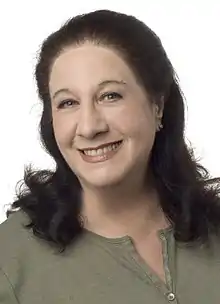Susan Salms-Moss
Susan Salms-Moss is an opera singer who made her career singing leading soprano roles throughout Europe. She has appeared in numerous theaters in Germany, as well as in Austria, France, Switzerland, Slovenia and the Czech Republic, and is known for her portrayal of psychologically complex characters.

Biography
Early life and education
Susan Salms-Moss was born as Susan Leslie Moss on April 28, 1946, in Brooklyn, New York, the daughter of Louis B. Moss, a manufacturer, and Dorris Teicher Moss, a homemaker. Her mother's family stemmed from near Lviv, which was then part of the Austro-Hungarian Empire, and her father's family came from Odessa and the surrounding countryside. Both sides of the family are Jewish. She grew up on Long Island and graduated from Great Neck South High School in 1963. In 1967, she earned her B.A. from Brown University, where she majored in French Literature. Parallel to this, she studied voice and performed extensively in concerts and onstage (e.g. Polly in The Threepenny Opera). Upon graduating from Brown, Salms-Moss moved to New York City and worked as part of a research project in foreign language teaching and testing methods at the Modern Language Association, while continuing to study voice privately, especially with Else Seyfert. Conductor Laszlo Halasz, founding music director of the New York City Opera, encouraged Salms-Moss to go to Geneva, Switzerland, and study with Maria Carpi, best known for having trained soprano Gwyneth Jones. The year of music studies at the Conservatoire de Genève convinced Salms-Moss to pursue a career in opera. In 1977, she earned a music degree at the Musikhochschule Rheinland (then called Robert-Schumann-Institut) in Düsseldorf, Germany, where she studied with Wagnerian soprano Astrid Varnay.
Career
Salms-Moss made her professional opera debut only a few months later, as the leading soprano at the Städtische Bühnen in Münster, Germany, singing the role of Amelia in Verdi's Un ballo in maschera. Her career took her to numerous theaters in Germany in the following years, during which she amassed an extensive repertoire. Early roles included Violetta in La Traviata, Mimi and Musetta in La Bohème, Marguerite in Faust, and Mozart roles such as the Countess in The Marriage of Figaro, Fiordiligi in Cosi fan tutte, and Donna Elvira in Don Giovanni. Her voice combines a dark timbre with an extended range and flexibility, making it ideal for Bellini's Norma and Abigaille in Verdi's Nabucco. Developing into the "spinto" and later the "dramatic" repertoire, she sang most of the Verdi heroines, such as Aida, Leonora in Il Trovatore, Desdemona in Otello, Leonora in La Forza del Destino, and Alice in Falstaff, as well as Puccini's Tosca and Giorgetta in Il Tabarro. She has embodied all three Janáček heroines, Katya Kabanova, Jenufa, and Emilia Marty in The Makropoulos Case. Ventures into modern repertoire included Fevronia in Rimsky-Korsakov's The Legend of the Invisible City of Kitezh, Marie in Alban Berg's Wozzeck, and Die Dame in Hindemith's Cardillac. Rare departures into traditionally mezzo soprano repertoire were Mélisande in Debussy's Pelléas et Mélisande and Judith Weir's Blond Eckbert. Lighter pieces included classical operettas, especially Rosalinde in Die Fledermaus, and the Mother Abbess in The Sound of Music in Innsbruck in its first Austrian production. She performed the major works of Richard Strauss, such as Salome, the Feldmarschallin in Der Rosenkavalier, and, having sung Chrysothemis in Elektra earlier, Elektra herself. Salms-Moss is known for her interpretation of psychologically complex roles, in particular Katerina in Shostakovich's Lady Macbeth of the Mtsensk District.
Salms-Moss is multilingual, fluent or with a working knowledge of English, German, French, Italian and Russian. Her original studies of and interest in languages and literature, as well as psychology, led her to delve deeply into the figures she embodies. Her concert programs include works in several languages and styles, in particular the French and Russian repertoire.
Parallel to her singing career, she became an experienced translator of German texts, including a number of published full-length books, and a member of the international translating group ExperTeam and is currently a freelance translator based in New York. She also offers a special program for American singers targeting a singing career in Germany, entitled "German and Germany for Singers."
Personal
Ms. Salms-Moss was married to Karl-Heinz Salms, a German interior designer, from 1974 to 2009, and has two daughters. She currently resides in New York City.